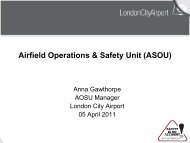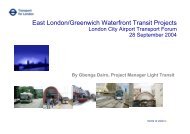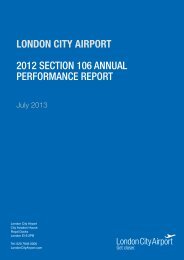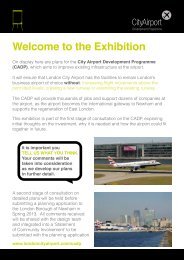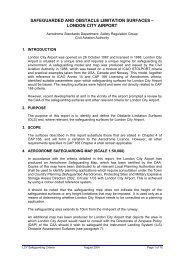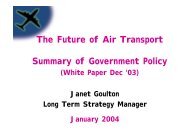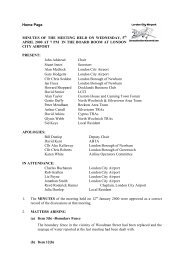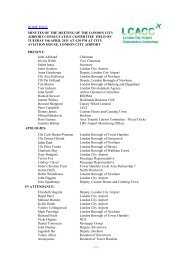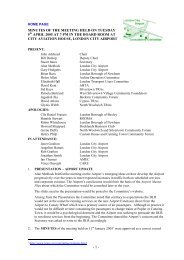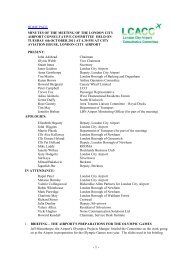The Mayor's Ambient Noise Strategy - Greater London Authority
The Mayor's Ambient Noise Strategy - Greater London Authority
The Mayor's Ambient Noise Strategy - Greater London Authority
Create successful ePaper yourself
Turn your PDF publications into a flip-book with our unique Google optimized e-Paper software.
10 Mayor of <strong>London</strong><br />
<strong>The</strong> Mayor’s <strong>Ambient</strong> <strong>Noise</strong> <strong>Strategy</strong><br />
Sleep disturbance<br />
2.7 A good night’s sleep is acknowledged as important to wellbeing. Losing<br />
sleep can be one of the strongest reasons people give for objecting to<br />
noise. Sleep research is, however, a complex and challenging field. It can<br />
be very hard to prove that a particular noise woke someone up. People<br />
typically wake up for many reasons, as well as the outdoor noise source<br />
which is being studied.<br />
2.8 <strong>The</strong> main issues are difficulty getting to sleep, being awoken too soon,<br />
getting back to sleep once awoken, and changes in ‘sleep stages’ - the<br />
type of sleep experienced. People may report after-effects from disturbed<br />
sleep, including reduced sleep quality, increased tiredness, depressed<br />
mood, and decreased performance, or lack of concentration. Researchers<br />
have also studied physiological effects understood as induced by noise<br />
during sleep. 9 <strong>The</strong>se include increased blood pressure, increased heart<br />
rate, increased finger pulse, vasoconstriction, changes in respiration,<br />
cardiac arrhythmia and increased body movements.<br />
Other adverse effects<br />
2.9 Other adverse effects of noise include:<br />
■<br />
■<br />
■<br />
Hearing impairment - Workers in certain industries have, if hearing<br />
protection or other measures have not been used, been at risk of<br />
hearing loss. <strong>The</strong>re is increasing concern about noise exposure in<br />
nightclubs, and other leisure venues, including pubs and restaurants.<br />
Some sufferers from tinnitus report their condition being brought on<br />
by one loud exposure. Environmental noise levels near busy roads,<br />
railways and airports are not considered to pose a risk of hearing<br />
impairment to local residents.<br />
Interference with speech and other communication - <strong>Noise</strong> can mask<br />
voices, radio/TV or other sounds, including music, which people want<br />
to hear. <strong>The</strong> extent of interference depends not only on the volume of<br />
the interfering noise, but whether it is similar in pitch or frequency to<br />
the sound people want to hear. Other factors include how distracting<br />
the interference is to the listener, and how good their own hearing is.<br />
Noisy environments can make communication harder for people with<br />
hearing impairments. It can become harder for people with visual<br />
impairments to sense where they are. <strong>Noise</strong> can cause people to keep<br />
windows closed when they would rather have them open.<br />
Cardiovascular and other physiological issues - some studies have<br />
identified associations at noise levels higher than normally associated<br />
with ambient noise, and for very long term exposure. <strong>The</strong> evidence is<br />
not strong, but it is important that research in this area continues.



